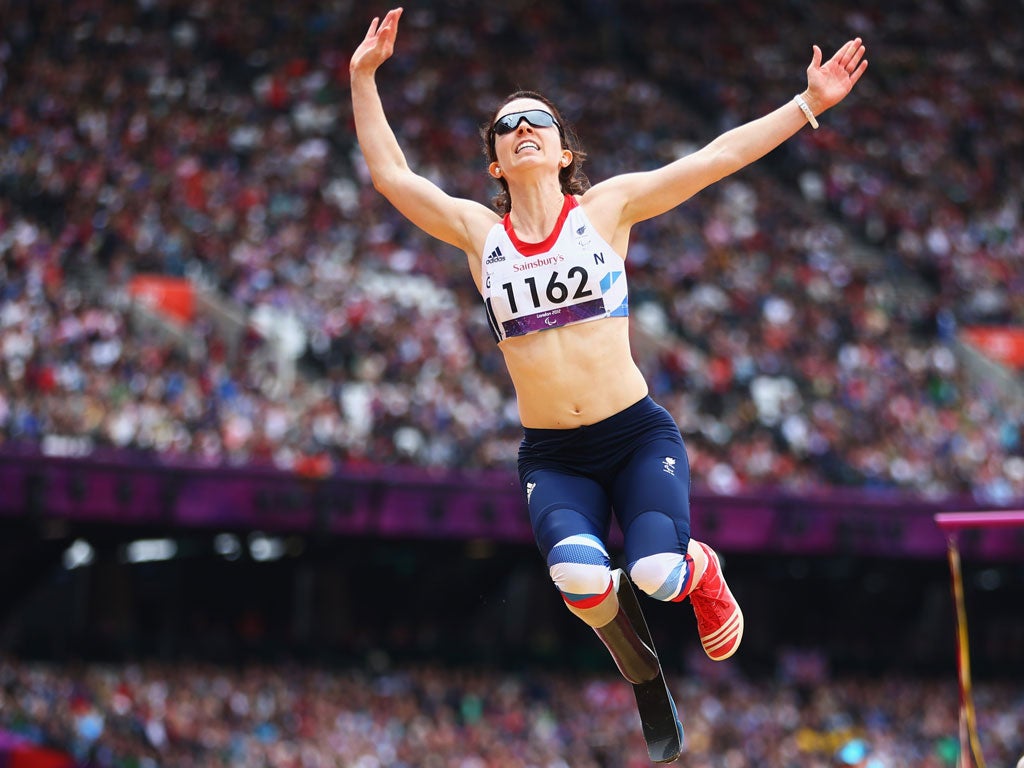A leap too far: Stefanie Reid denied gold despite breaking Paralympic record – twice
Long jumper gracious in defeat as quirk of points system leaves her in second place

In one of the Paralympics' near inevitable idiosyncrasies, Great Britain's Stefanie Reid leapt almost a metre further than her nearest rival in the long jump final, breaking the Paralympic record twice along the way, and yet she won only the silver medal. Australian Kelly Cartwright took gold.
The final grouped together the F42 and F44 categories. Reid has one leg amputated below the knee, the Australian above the knee, with different points systems used to rank their jumps. The situation only arises because there aren't enough competitors to hold the two finals separately.
Cartwright jumped 4.38m, giving her a points score of 1,030. Reid jumped 5.28m, a lifetime best, but this equated to only 1,023 points, leaving her in second place.
"It's obviously quite a controversial area and it is really disappointing that they chose to combine the events on a points system," said Reid. "It's tough, but now is not the time to get upset about it. Kelly was a great competitor and jumped amazingly and deserves it. Hopefully, in the future it will be reviewed again but I think today is just about celebrating.
"My emotion was of disappointment. But I realised these Games are about inspiration and legacy. Today you saw an amazing group of confident females who have disabilities. It was really beautiful."
It was nevertheless a remarkable comeback for Reid, who suffered a stress fracture to her back last autumn and missed almost the whole season. She was favourite before the competition, but still has the 100m and 200m sprints to come, where she may yet win more medals.
Patrick Jarvis, a Canadian member of the International Paralympic Committee board, admitted at the weekend that "classification is, by its nature, inherently unfair".
"I wouldn't say it's a worry, but classification is what makes us a distinct sport," he said. "What we've tried for is to get it right. At the end of the day, it's as fair as possible both for the overall competition and the integrity and expectations of the individual athletes."
Reid was born in New Zealand to a Glaswegian father and a mother from Darlington, but grew up in Canada. It was here, on holiday on a lake near Toronto aged 16, that she was struck by the propeller of a boat. She lost so much blood she almost died, and ended up losing her right leg below the knee. She won bronze in Beijing four years ago in the 200m, competing for Canada. "People ask if I feel odd having competed for Canada and now for Britain but I just say I feel like a product of the Commonwealth," Reid said in an interview earlier this year.
"I have seriously proud British parents, and as there is a bit of tension between the English and the Scots, they would each try to teach me their own version of history. Their passion for Britain passed down to me."
The captain of her school swimming, basketball and rugby teams, she was just as serious a sportsperson before her accident as she is now. She had planned to go to university in New Zealand and try to make it as a rugby player. She now alternates her life between Loughborough, where she trains, and Dallas, Texas, where her wheelchair racer husband Brent Lakatos works as a software engineer.
Join our commenting forum
Join thought-provoking conversations, follow other Independent readers and see their replies
Comments
Bookmark popover
Removed from bookmarks